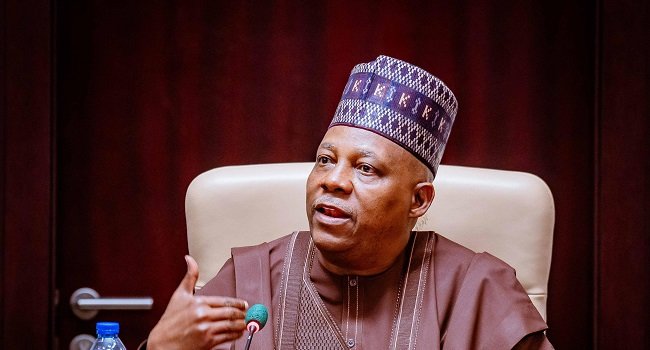VICE PRESIDENT Kashim Shettima has revealed that he was nearly removed as the Governor of Borno State during the presidency of Goodluck Jonathan, and only escaped the fate due to the intervention of the then Attorney General of the Federation (AGF), Mohammed Bello Adoke.
Shettima, who governed Borno from 2011 to 2019, made this disclosure on Thursday in Abuja during the public presentation of Adoke’s memoir, “OPL 245: Inside Story of the $1.3 Billion Nigerian Oil Block.”
“I was the most demonised public official during the Jonathan era,” Shettima declared.
“There was even a plan to illegally remove me from office, but Adoke stood firm and told President Jonathan that he had no constitutional authority to remove even a councillor, let alone an elected governor.”
At the time, Borno State was at the epicentre of Boko Haram’s insurgency, and Shettima’s administration was under intense federal pressure amid deteriorating security conditions.
In December 2011, Jonathan declared a state of emergency in parts of Borno and Plateau states. By May 2013, the emergency was extended to cover the entire states of Borno, Yobe, and Adamawa.
Despite the escalation, President Jonathan stopped short of suspending any governors, a decision that was reportedly influenced by Adoke’s legal advice, which maintained that governors could not be removed arbitrarily without breaching the 1999 Constitution.
“Adoke showed uncommon courage. He reminded the president that democracy has its boundaries and that the law must always prevail,” Shettima said.
“He could have bowed to pressure, but instead, he upheld the constitution.”
Shettima’s remarks come amid renewed debate over federal overreach and constitutional adherence, particularly following President Bola Tinubu’s recent declaration of a state of emergency in Rivers State on March 18, 2025.
In an unprecedented move, Tinubu’s administration suspended the state’s elected governor, Siminalayi Fubara; Deputy Governor Ngozi Odu; and all members of the State House of Assembly for six months. He then appointed Vice Admiral Ibokette Ibas (rtd) as administrator to govern the oil-rich Niger Delta state.
The decision has sparked widespread condemnation and rekindled debates on executive overreach, particularly as Adoke’s counterpart in the current administration, AGF Lateef Fagbemi (SAN), defended the legality of the suspension—a stark contrast to Adoke’s constitutional stance during Jonathan’s tenure.
Many observers have pointed out the irony in Shettima’s commendation of Adoke for preventing an unconstitutional act under Jonathan, while serving in an administration now accused of similar executive overreach.
“It’s difficult not to notice the contradiction,” said a constitutional lawyer in Abuja.
“Adoke stood his ground against removing a sitting governor under Jonathan, while today’s AGF justified a sweeping suspension of democratic institutions in Rivers under Tinubu. The contrast is striking.”
However, supporters of the Tinubu administration argue that the Rivers crisis was unique and threatened public order, necessitating extraordinary intervention.
Still, legal analysts argue that such decisions must always be grounded in clear constitutional provisions, not executive discretion, warning that any perceived abuse of emergency powers could set dangerous precedents for Nigeria’s democracy.
The event where Shettima spoke was the unveiling of Adoke’s new book, which details his experience as Nigeria’s attorney general, including the controversial OPL 245 oil block deal, alleged political persecutions, and his reflections on upholding the rule of law during a tumultuous period in Nigeria’s political history.
In his memoir, Adoke repeatedly emphasizes that respect for constitutional boundaries is non-negotiable, a principle Shettima echoed during his remarks.
“History will be kind to Adoke,” Shettima said.
“He may not have pleased everyone, but he stood for legality when it mattered the most. I am here today as Vice President partly because one man refused to compromise the law.”







